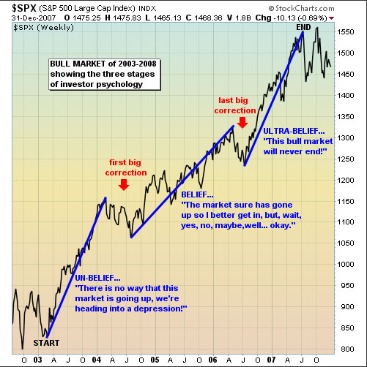Investment Psychology Explained
Table of Contents Heading
- Psychology
- Mastering The Market Cycle
- Memory: Exam Buster Revision Guide For Aqa A Level Psychology
- The Barefoot Investor
- Deliberate Things To Do To Improve Your Trading
Make a deliberate effort to stay out of the market after you have experienced a profitable campaign. This “vacation” enables you to recharge your emotional batteries and subsequently return to the market in a much more objective state of mind. Suppress your own emotional instincts by following a carefully fully laid out investment plan, you are much more likely to succeed. Market prices are determined more by emotion than reasoned judgment.
This self-delusion is far less pronounced and even nonexistent in successful market participants. Goodreads is the world’s largest site for readers with over 50 million reviews. We’re featuring millions of their reader ratings on our book pages to help you find your new favourite book. AbeBooks, the AbeBooks logo, AbeBooks.com, “Passion for books.” and “Passion for books. Books for your passion.” are registered trademarks with the Registered US Patent & Trademark Office. Well, the world did not end the markets did not crash, they actually rallied in the face of extreme negativity. The Dow is still not out of the woods, a test of the August lows is expected unless the trend on the SPX suddenly turns positive. The volume of negative articles and manufactured negative data continues to rise, setting the base for the Feds to sell “the prince rescues the poor damsel in distress story”.

If you want to get in on the action, this book shows you how. Cryptocurrency Investing For Dummies offers trusted guidance on how to make money trading and investing in the top 200 digital currencies, no matter what the market sentiment. You’ll find out how to navigate the new digital finance landscape and choose the right cryptocurrency for different situations with the help of real-world examples that show you how to maximize your cryptocurrency wallet. This study claims that to profit in today’s markets, investors must be more analytical and less impulsive. The author aims to expose the delusions that snare investors and shows how to develop profitable habits and attitudes instead. Learn and understand the rules that separate the truly great investors and traders from the rest.
Psychology
Your use of the site and services is subject to these policies and terms. This is the price a seller has provided at which the same item, or one that is nearly identical to it, is being offered for sale or has been offered for sale in the recent past. The price may be the seller’s own price elsewhere or another seller’s price. The “off” amount and percentage simply signifies the calculated difference between the seller-provided price for the item elsewhere and the seller’s price on eBay. If you have any questions related to the pricing and/or discount offered in a particular listing, please contact the seller for that listing. Mental accounting refers to the different values a person places on the same amount of money, based on subjective criteria, often with detrimental results.
- In essence, this is a perfect example of “Groundhogs day” in action.
- Losing money is an accepted aspect of playing the market.
- This site uses cookies to deliver our services, improve performance, for analytics, and for advertising.
- Be animated by controlled greed and fascinated by the investment process.
- During an economic boom and bull market, people get accustomed to healthy, albeit paper, gains.
Questions remain over whether these behavioral finance theories can be used to manage your money effectively and economically. EMH proponents argue that events like those dealt with in behavioral finance are just short-term anomalies or chance results and that over the long term, these anomalies disappear with a return to market efficiency. The theory that most overtly opposes behavioral finance is the efficient market hypothesis , associated with Eugene Fama & Ken French . Extreme cases of over- or under-reaction to market events may lead to market panics and crashes. It doesn’t take a neurosurgeon to know that people prefer a sure investment return to an uncertain one—we want to get paid for taking on any extra risk. If the item details above aren’t accurate or complete, we want to know about it. I have read Research and Markets’ Privacy Policy and consent to the processing of my personal data.
Mastering The Market Cycle
An investment advisor won’t necessarily get flooded with calls from her client when she’s reported, say, a $500,000 gain in the client’s portfolio. But, you can bet that phone will ring when it posts a $500,000 loss! A loss always appears larger than a gain of equal size—when it goes deep into our pockets, the value of money changes. Oddly enough, many people feel much less embarrassed about losing money on a popular stock that half the world owns than about losing money on an unknown or unpopular stock. But researchers questioning this assumption have uncovered evidence that rational behavior is not always as prevalent as we might believe. Behavioral finance attempts to understand and explain how human emotions influence investors in their decision-making process. Economic theory is based on the belief that individuals behave in a rational manner and that all existing information is embedded in the investment process.

We deliver the joy of reading in 100% recyclable packaging with free standard shipping on US orders over $10. MARTIN J. PRING is publisher of the highly regarded newsletter, The Pring Market Review.
Memory: Exam Buster Revision Guide For Aqa A Level Psychology
If you clung to stocks that you bought in 1999 at the height of the dot.com boom, you would have had to wait a decade to break even, and that is for non-technology stocks. This is about psychologically protecting your previous choices or decisions — which is often disastrous for your investments. It is truly hard to take a loss and/or accept that you made the wrong choices or allowed someone else to make them for you. But if your investment is no good, or sinking fast, the sooner you get out of it and into something more promising, the better. Behavioral finance has increasingly become part of mainstream finance.
If you intend on gaining a better understanding of this discipline, look no further than this book. One mistake is to deviated from an investment plan temporarily. Watching price quotations constantly is a sure way of losing LT perspective. Hard work, common sense, patience and discipline are valuable attributes to smart investing.
The Barefoot Investor
It continues the argument in The Aggressive Investor that the way we think is the real difference between winning and losing as investors and traders. In The Psychology of Investing, Colin presents his ideas in his very easy to read style. Some difficult and technical ideas are explained in layman’s terms.
This assumption is the crux of the efficient market hypothesis. Prices, promotions, styles and availability may vary by store & online. Dear, we have just introduced a new online credit bonus program with CSN-Browser. Dispense with the myths and delusions that drag down other investors. The majority of research into the Investment Model is correlational, so psychologists are unable to conclude that investment causes commitment in relationships. This limits the predictive validity of the model, as it would fail to predict which types of investment and how much investment will lead to long-term commitment to a relationship. Irrational exuberance refers to investor enthusiasm that drives asset prices higher than those assets’ fundamentals justify.
Deliberate Things To Do To Improve Your Trading
Whenever hope becomes a chief factor in determining a market position, sell out promptly. By consciously under-trading, that is taking positions much smaller than you might be able to, you will gradually learn to hold back until you find the real money-making making opportunities and stay with major trends. Go back to the point at which you made the mistake and ask yourself what your options were at the time. Then mentally go through those possibilities, working them through to their possible outcomes. When you have discovered two or three scenarios with positive outcomes, remember them for the next time you are faced with a similar market condition. The odds of success will be greatly enhanced if you can rehearse it first. Whenever you feel overly stressed because of factors outside the market, you are advised to stay away or to make as few decisions as possible until your condition improves.
all successful traders and investors are loners, creative and imaginative independent thinkers. Their theory that market prices efficiently incorporate all available information depends on the premise that investors are rational. Many investors believe they can consistently time the market, but in reality, there’s an overwhelming amount of evidence that proves otherwise. Overconfidence results in excess trades, with trading costs denting profits. Investors get optimistic when the market goes up, assuming it will continue to do so.
One strength of the Investment Model is that it is supported by numerous research studies. For example, Le and Agnew found that satisfaction, comparison with alternatives and investment greatly contributed to commitment.
Carnival on Wall Street examines the roots of the blind faith in free markets, globalization, technology, and financial models that both fueled and ultimately doomed global financial markets in the 1990s. Authors Jane Hughes and Scott MacDonald guide readers through the factors–financial, economic, and political–at work in the Wall Street stock market bubble. Both entertaining and easy-to-read, the text takes an applied approach that brings this fascinating decade to life through intriguing anecdotes about real people and real events.
Resist the fads and so-called experts whose siren call to success can lead to disaster. For example, parents who are committed to their relationship and invest in it will have a higher chance of ensuring their children’s survival and therefore of passing on their genes. This means that the Investment Model supports the nature side of the nature-nurture debate. Even though the importance of investment was clearly demonstrated by research, some psychologists think that Rusbult’s idea of relationship investment is oversimplified. For example, Goodfriend and Agnew argue that it is not just things we bring to the relationships that could count as investment, but also a couple’s plans for their future. In their view, partners will be committed to staying in the relationships because they want to see these plans realised. This shows that investment in romantic relationships is a complex phenomenon, consisting of many different factors, which makes the Investment Model reductionist.
Sign up for LibraryThing to find out whether you’ll like this book. This site uses cookies to deliver our services, improve performance, for analytics, and for advertising. By using LibraryThing you acknowledge that you have read and understand our Terms of Service and Privacy Policy.
Item 4 Investment Psychology Explained: Classic Strategies To Beat The Markets 4
Beating ourselves means mastering our emotions and attempting to think independently. To ask other readers questions aboutInvestment Psychology Explained,please sign up. To see what your friends thought of this book,please sign up. Don’t believe everything a corporate official says about his company’s stock.

